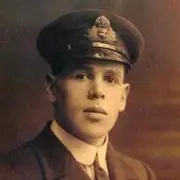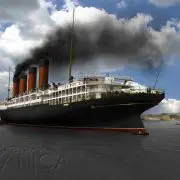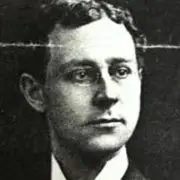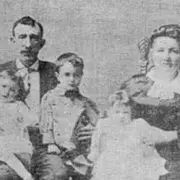The Lusitania : Part 14 : Casualties of War
Sitting at Barbara’s kitchen table, on a late summer visit, we eat potato chips from a bowl she has put out. “Don’t worry about the mess, I’ll clean up!” she says: Mrs. McDermott remains proud of her energy level and would not think of allowing guests to carry their own plates to the kitchen sink.
As she goes to bring out a homemade dessert, I take a moment to look over her collection of postcards, sent by friends and fans, which she has tucked into the door of her china cabinet. Many show modern cruise ships and cityscapes, but a few, I note, show the Lusitania. It does not escape me that had Emily been a few steps faster or a few steps slower aboard that ship, on the afternoon of May 7th 1915, none of this would likely be happening. Children below the age of four were, statistically, the group hardest hit by the disaster. Only timing and extremely good luck allowed this kind and loving woman the chance to live beyond two years and eleven months.
Talk turns, as it always does by nature of our project, to the Lusitania, when Barbara returns to the room with a chocolate and whipped cream dessert soufflé. “Why did they have to do it?” she asks, rhetorically, about the torpedoing. “We weren’t hurting anything. What could we have done to them? Why didn’t they just let us keep on going?”
Those very questions are the source of endless discussion, and have been since May 7th, 1915. Whatever the morality of the situation, it was certainly a public relations disaster for Germany. It did not drive the U.S. into the war but it marked the point beyond which U.S. support for the German cause began to dramatically erode.
Hoboken Germans Do Not Exult Over Sinking of the Lusitania
Reported celebrations throughout Germany of the sinking of the Lusitania have not been paralleled by any demonstration among the large German population in Hoboken. In fact, resorts in the five square mile city chiefly patronized by those of Teutonic origin were quieter on Saturday night than at any time since the beginning of the war. This condition applied both to the places along the River Street waterfront where sailors from the interned German liners and longshoremen congregate, and those as well that are made the headquarters of officers from the ships and German-American residents of means.
“No” said the headwaiter in a resort that has been more than suspected of being headquarters for agents of the Kaiser’s government, “There has been no celebration. It is a very sad thing- but of course that is war” he added, evidently fearing his hearer might construe his remark as an admission that the sinking of the Lusitania was not justified.
“What do the German merchant sailors say about it?” he was asked.
“They are very sorry for the crew. They say the passengers were warned and need not have sailed, but that the crew had to go and that it was not right they should have been killed.”
Since the outbreak of the war, Hoboken has been a hotbed of pro-German sentiment, but the Lusitania disaster seems to have cooled the ardor of even the Germans themselves. Many of those to whom the subject is broached attempt at first to justify the affair in a half-hearted fashion, others merely shrug their shoulders. Very few try to defend the act with any of the customary warmth they were wont to exercise in former war arguments
Jersey Journal. May 10, 1915.
Two Stabbed in Fight Over The Sinking of Ship
Man Who Defends Germany in Discussion Over Lusitania Horror and Allies’ Sympathizer Both Cut.
A fight growing out of an argument over the sinking of the Lusitania led to two men being stabbed and cut early yesterday. The trouble occurred near the Bayonne plant of the Standard Oil Company. All who took part in the affair were arrested by Patrolmen Connors and Curran. Two of the men, Frank Campbell and Frank Woerner were taken to the Bayonne hospital. Campbell had a cut in the head and Woerner received a serious wound in his left breast near his heart.
Jersey Journal, May 10, 1915.
Those who survived were often very effective anti-German propagandists. Charlotte Pye, who sank into deep depression after losing her daughter, found reason to go on living when she began appearing at enlistment rallies and fundraising events. Rita Jolivet made two Lusitania films, into one of which she poured $250,000.00 of her own money. The ship became a potent image on enlistment posters and anti-slacker magazine ads. With the Lusitania the die was cast; heroic Great Britain and America versus Hunnish brutes, and no amount of justification by Germany could undo that perception. For that reason, if for no other, the Lusitania should have been allowed to pass unmolested.
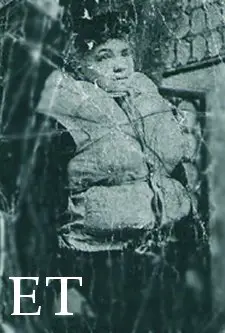
Phoebe Amory in her Lusitania lifejacket, ca. 1915-1917 |
A great example of how effective the Lusitania survivors could be as propagandists, is the pamphlet published by Mrs. Phoebe Amory. Part first person account of the disaster, part call to arms; it beautifully captures the essence of public sentiment in Great Britain and Canada in 1916/1917.
Mrs. Amory, of Toronto, booked herself aboard the Lusitania at the last minute. She claimed in her 1917 account, that her five sons were in military service , with two in training, and three already in service overseas, and that on April 27th, she made up her mind to visit them “probably for the last time on earth.”
She decisively booked passage on the May 1st sailing for an extended vacation in England. Here she stretched the point a bit: one son, in fact, was neither in training nor in service, and she had planned on going over a bit earlier to care for her mother but received a cable informing her of her mother’s death. Her daughter, Beatrice, was to have accompanied her on the crossing, but she changed her mind and did not book passage.
Mrs. Amory was descended from a long line of sailors, and although she knew the general risk of a wartime passage, and knew specifically of the German warning, she would later declare that “…it is only natural, and not to be attributed to a desire to boast, that I should have made the voyage warning or no warning.”
Phoebe’s cabin mates in her second class room were Mary Higginbottom (sometimes listed as Higginbotham) of Fall River, Massachusetts, “ A handsome girl, with beautiful fair hair. When I first saw her she was wearing a perfect fitting dress of black velvet, and I was so impressed with her beauty and her frank, straightforward manner of introducing herself to me, that I felt I had indeed been fortunate in having such a charming young lady for a voyage companion” and Martha Whyatt , ( to whom Phoebe referred as Mrs. Whiret) who, until recently, had been nursing a relative in the United States “This uncle left her considerable property and she was returning to her native land to spend the remainder of her life among relatives and friends. I believe I have never known a more kindly woman, nor one who seemed to be more ready in a case of emergency to lend a helping hand.” Mrs. Amory was here confused: Mrs. Whyatt had lost her husband, Aaron, not an uncle.
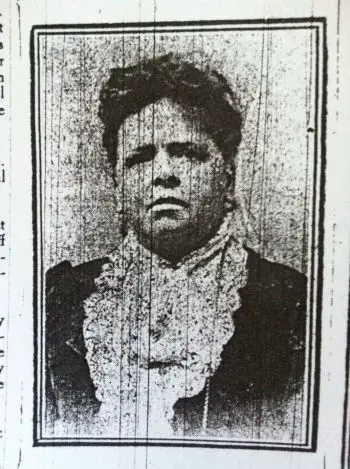
Martha Whyatt
Miss Higginbottom and Mrs. Amory dined together on the first night, and Mrs. Amory was particularly impressed with the dining saloon:
Such a beautiful dining-room I had never seen, either aboard ship or in the magnificent hotels that I have visited on both sides of the ocean. The pillars, extending from floor to ceiling were as snowy white as the linen that covered the long tables. The walls and ceiling were frescoed in delicate tints, and in the centre there was a round, open, balcony which permitted one to stand above and gaze down upon a spectacle that I believe could not be duplicated elsewhere.
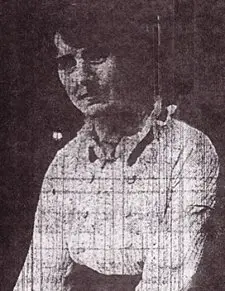 Mary Higginbottom Mary Higginbottom |
Mrs. Amory spoke only brieflyabout her seven days aboard the ship in her long account. Miss Higginbottom disappeared from the narrative after the first evening, but Phoebe mentioned, in passing, that Mrs. Whyatt carried with her a large supply of medicine, which she dispensed among those suffering from seasickness. Phoebe sold programmes for the Charitable Concert, and was allowed access to first class in order to do so. One man paid for his programme with a five dollar bill after claiming to have already purchased one (“He could not resist my good natured smile”) and allowed her to keep the change: she would later claim that the generous purchaser was Alfred Gwynne Vanderbilt. “I met with similar success in nearly all of the cabins and on the decks and soon had realized well on my programmes.”
May 7th found Mrs. Whyatt ill. She had been indisposed the night before and was still nauseous that morning. Phoebe prevailed upon her to dress and go out on deck for fresh air. Martha Whyatt found herself in an ideal position to escape and was, in fact, saved. Phoebe had arranged for a bath, planning on attending lunch immediately afterward, and so was in the dining saloon in the unusual outfit of negligee and raincoat when the Lusitania was torpedoed.
…as it was permissible to go to the dining room at lunch hour clad in negligee, I slipped on my raincoat and hurried to lunch. The bath had improved my appetite, and I was feeling as though I could go through the meal at will. I took my place at the table, and had given my order. It then occurred to me that I would like a salad and as the steward placed the soup before me I was on the point of ordering the salad when there came the most terrible crash… There was a rush for the stairs, and everyone was trying to ascend the narrow stairway. Realizing that something of a terrible nature had occurred, I seemed to be possessed of super-human strength and was able to push through where stronger persons were held back.
Mrs. Amory emerged on deck and later described, at length: The screams of the women and children were terrible to hear…women were fainting and falling to the deck, only to be carried overboard by their own weight.
A hero appeared just as Phoebe Amory began to despair: a young man said “Here, mother, take this belt” and helped her into a lifebelt. “I did not see him among the survivors; I believe he was lost and never will forget his brave deed, for I feel certain he gave his life to save mine.” Phoebe, like so many others, was placed into a lifeboat, only to be thrown out as it capsized. “We were brought up against the side of the ship with an awful crash and were thrown into the water. Fortunately we were nearly down when the accident occurred and had not far to fall, but the confusion was great. Those who did not have lifebelts sank almost immediately. On every hand were floating bodies, their upturned faces showing white and ghastly.”
She was pulled into a second lifeboat, where she hung for a time with her upper body over the boat’s edge and her legs and lower body still in the water. Eventually space was found and she was dragged all the way in. That evening her boat was picked up by a fishing vessel: “…as soon as they lifted me aboard I fell to the bottom of the boat and lay there until one of the men in charge came and lifted me up and offered me hot tea. The tea helped warm me up considerably, but my teeth chattered and my limbs shook as though afflicted with the ague.”
Phoebe Amory considered herself lucky. Although she had lost all but the clothing in which she was rescued, and her lifebelt, she had lost no one, other than cabin mate Mary Higginbottom, in the sinking. She was uninjured (a claim she made in 1917, contradicted by her later case against Germany) and able to resume her journey to England after a short rest in Queenstown.
Mrs. Amory’s 1917 account ends with a long, chest beating, call to arms:
The greatest of all punishments we can give these murderers and baby killers is to stand organized to the last man if necessary…and force them to their knees, begging for mercy at their impotence. Our men will treat their women with respect, and well they know that no man who belongs to the Army of the British would loose a torpedo to murder their wives and mothers.
the last lines of which seems both painfully naïve and sad when one reads of what a Man of the Army of the British later did to Mrs. Amory:
Mrs. Amory Loses Jewels
Befriended Returned Soldier and He Takes Lusitania Survivor’s Medal.
Misplaced confidence in the probity of a returned soldier to whom she extended the hospitality of her home cost Mrs. Phoebe Amory of 10 Beaconsfield Ave, Lusitania survivor, $200 worth of jewels. It was after service on Sunday last that the returned soldier was introduced to Mrs. Amory, who gave him work in the garden. He came every day until Thursday, after which he did not return. Then it was discovered several rings, a gold watch, and a medal were missing. The police were put on the case and in a short while recovered part of the jewels. Among the lost valuables is a gold medal, which was presented to Mrs. Amory by the Duchess of Marlborough in recognition of recruiting achievements in England two years ago.
One wonders if she slipped into “Lost Generation” cynicism afterwards.
Seeking reparations at the close of the war, Mrs. Amory filed a claim for $12,720, only $1,660 of which was for lost personal possessions. She claimed that her left side “has been almost paralyzed since then” and that she suffered a rupture in her right lower abdomen. The court decided $6,650 was fair compensation. Despite such injuries, Phoebe lived to be 92, and died on April 17, 1942 in Welland, Ontario.
Phoebe Amory, like many educated women of her generation, dabbled in poetry, and we shall end her segment with her Lusitania memorial poem:
THE DEATH OF THE LUSITANIA
O LUSITANIA, Empress of the Sea,
Art thou dead and buried in the deep.
With all thy freight of human souls,
Victim of the Huns ’most Hellish darts.Come nations!
Rise, avenge this hideous crime.
Avenge the cries of English hope,
now lying cold and dead in ocean deep.Come nations!
Rise and crush
This hideous foe: this vampire of the world,
Who is no man but just a beast of prey respecting nothing.
Laying waste to works of centuries.
Breaking hearts and homes on every side.
Come quickly, come, o’er England’s blood
Be shed in vain, her noble sons all dead
And lying on the plains.Come, nations!
Crush this vampire into dust;
come quickly, come.O Lusitania, my tears are falling for thee
Fair village of palaces, gone for evermore
Beneath the cold blue waters.
Survivor Duncan Hanes recounted the final moments of Mrs. Amory’s cabin mate, Mary Higginbottom:
…a young lady with whom I was acquainted and whose name was Miss Higginbotham (sic) came over and urged me to join her party in a game of cards. It was while I was declining as politely as I could, this invitation, and while we were both standing on A deck very near the stern of the boat that we heard a sudden crash, and in a second debris was falling all around us…I escorted Miss Higginbotham to the point where the boats were about to be lowered. She entered one of the first ones, which owing to the momentum of the ship- it was going about 18 knots when struck- foundered as soon as it struck the water and she, with dozens of others, was drowned
Martha Whyatt, Mrs. Amory and Miss Higginbottom’s cabin mate, left this account:
It is indeed a miracle that I am alive. It was a terrible experience – I never want to put my foot on a boat again. I was a second-class passenger on the Lusitania. When we left New York, the band was playing and the Welsh choir was singing. I never heard of any warning of any sort, or else you can guess I should have been on the look out for submarines.
It was a beautiful day, and I had not got up that morning until about eleven o’clock. We had our tickets given us so that we could go ashore. I had just left the dining-room to go into the sitting room when the first explosion came. The band had been playing “It’s a Long, Long Way to Tipperary.” It was just like a lot of cannon going off. The ship rocked from one side to the other, and everybody was tumbling about. There was almost a panic for the moment and a deal of running about and confusion. Then the second explosion came.
A young man who was quite unknown to me put a lifebuoy round me, which had a collar to fit the neck, and which fastened under the arms. I heard one young man say to another, “We have not done all that we ought to have done, Let us pray!” They prayed and then one said “Let us sing!” and all the people round joined in singing “O God Our Help in Ages Past.”
In another moment the boat seemed to dive. I put my hands over my face and cried “Oh Lord, have mercy on me.” I saw the water, as it were, rushing towards me. I shall never forget the sight of all those hundreds of people, men, women and children, struggling in the water. I can still hear the screaming of the children. Women were holding up babies, men were swimming around and holding others up in the water. I composed myself and resigned myself to my fate. I floated on my back and folded my arms on my breast, and tried my best to keep conscious. The bodies of children and old men floated past me. Many people had their faces and heads bleeding. They had evidently been wounded by the explosions. I saw one old man with blood streaming down his face, sink for the last time.
The water was not cold, but after I had been drifting for some time, I began to feel a chill in my feet and hands. I was in the water for four and a half hours, and I had floated over 20 miles before I was picked up about four miles from land by a small steamer. I heard a man shout, “A woman! A woman!” They picked me up, and cut my clothes off me, and rubbed me, and wrapped me in hot blankets. The captain asked me if I could speak, and after a while, I was able to speak to him.
There were thousands watching as some bluejackets carried us ashore. An officer came to me and asked my name and address. He said, “Are you a British subject?” I replied “British to the backbone!” “Good,” he answered, “you are a brave little woman.”
They took us to a hotel at Queenstown and put us to bed, and we slept two in a bed. Everyone was very kind and I was given some clothing before I went on with a party of survivors to Kingstown, where we boarded a boat which took us to Holyhead. A special train was waiting, and a young man, whom I did not know, was most kind to me, and looked after me very well. He was going to London and at Chester, he put me in charge of another person who was traveling to Manchester. He had lost all he possessed, and had not a penny.
I arrived at Manchester about a quarter past four on Sunday morning. Someone procured a taxi-cab for me, and I landed here about a quarter to five. Have I lost everything? Well I had 500 dollars worth of luggage with me; that has gone, but I managed to save my uncle’s watch, which was in my bodice.
Poor Miss Polly Hegginbottom, (sic) of Audenshaw, slept in the same berth as me. I am afraid she is lost. To get to our bunk, which was No. 82, E Deck, she had to descend about three flights of stairs. It was an outside berth, with a port hole. Miss Hegginbottom always went down to the berth after luncheon, and I had been speaking to her not many minutes before she said she would go to the berth. I never saw her again, There was a lot of luggage in the corridor, and I think the force of the explosion would block up the passage with the baggage, and she would be unable to get out. She was a very nice girl, and I quite liked her.
Mrs. Whyatt, 74, died on November 27, 1928.
Arthur Burden, William Harkness’ cabin- mate died on May 7, 1915. His second engagement of war aboard a Cunard liner would be his last. He was aboard the Carmania, in 1914, when she destroyed the Cap Trafalgar, and left this account:
On Thursday, August 13th, the Carmania came into commission, and I joined about noon. The remainder of the day and Friday were very busy, while the ship was lying just off the landing stage. “So near yet so far”.
Early on Saturday morning August 15th, we left out moorings and made for the open sea. Soon after 9am, the whole ships company were mustered on the lower deck forward and stood with uncovered heads while the Captain read out to us the articles of war. About 10.30am we sighted a steamer and cleared for action. The vessel that had so clearly aroused our interest was no other than the C.P.R Empress of Britain. Later in the day we overhauled a small tramp steamer. She hesitated before answering our challenge, and one blank was fired before she realized that we meant business
On Monday, August 17th, we began to assume a more orderly routine, and proper watch lists were drawn up, and the war routine notices were posted. After “divisions” a floating target was lowered into the sea and several rounds were fired as a preliminary test of the guns and gun crews.
On Friday, August 21st, a steamer’s smoke became visible about 4pm. Quarters were sounded and we all repaired to our stations thinking it heralded an action with a German cruiser. We gave chase and fired one blank for her to stop. She hove to, and we were very much relieved to find that our first scare only amounted to a passenger steamer belonging to the Italian American Line. Her passengers had assembled on deck, and we were quite as much relieved that we had only given them as much a scare as we had received ourselves.
On Monday, August 31st, we exercised “Abandon ship” after divisions. The weather was becoming more tropical daily and the white suits we had bought in Bermuda were much appreciated. Late on Thursday evening we passed the lights of Permanbuco, and on Friday September 11th, we received a wireless intimating that a tramp steamer was leaving there with coal and stores for German ships.
Our instructions were to double back and intercept her. We arrived off Permanbuco about 9pm. The night was very dark and the air full of excitement when “action stations” were sounded about 3am. A steamer was seen to leave, so it was thought. We gave chase in a heavy rain squall, firing four blanks. At this point we discovered a cruiser right across our bows, which proved to be H.M.S Cornwall, whose picket boat had been sent close in to the shore to warn her if and when any vessel should attempt to leave the harbour. It was now assumed that the tramp steamer had doubled back to port and we shaped our course south again for the Island of Trinidad.
We sighted the Island of Trinidad about 9am on Monday morning, September 14th, and upon closer inspection saw that some ships were at anchor there. Action stations were sounded and we readied for engagement. One of the ships was identified as the CapTrafalgar. I would like to say that the action will remain in my mind as long as I live. After the other ship had sunk I went round the deck, and the sight that met my wondering eyes was horrible. The Carmania certainly never looked as though she had not long since carried hundreds of passengers safely across the North Atlantic. Her decks were covered with pieces of shell, of the ships side and woodwork. Her bridge was still in the throes of fire and water and all our rooms were in danger from both. Fortunately my clothes escaped with very little damage, while several of the others lost everything. Five of our crew were killed outright and four were so seriously wounded that their lives were despaired of. About twenty two others had wounds varying in seriousness and the doctors were kept very busy. I was very thankful indeed when the Cornwall picked us up and escorted us to Abrolhos Rocks. We arrived there at daybreak on September 16th, and made what temporary repairs we could. I went on board the Cornwall in the evening and had a good time.
At 5pm on Thursday 17th, we sailed under the escort of the Macedonia bound for Gibraltar. On Friday, September 18th, Action stations were sounded at 9.50am, but the scare proved to be an English collier.
Arthur Howell Burden was born in 1890, the eldest of three children born to Mrs. John Howell Burden of Chiswick. As a child, Arthur attended the choir at his local church of All Saints where he later became a server. Upon leaving school, he went to work at a local brewery as a clerk, but continued to work at All Saints as a Sunday school teacher.
He decided to give up office work for a job at sea, for the benefit of his health. His first maritime employer was the P&O Line.
Arthur joined the Royal Naval Reserves on January 1, 1915, but continued to work for Cunard. He joined the RMS Lusitania as an assistant to Chief Purser James McCubbin. Burden didn’t have to share cramped accommodation like many of the crewmembers; he shared a twin cabin on C Deck with his fellow Assistant Purser, William Harkness.
Nothing is known of Burden’s movements on the Lusitania’s last voyage, but his body was recovered and identified as number 11. He was returned to Chiswick on May 11th for burial. A large public service was held at All Saints, and Burden’s coffin was draped in the Union Jack. The organist and choir were present, the church rung with the hymns “Nearer my God to Thee” and “O God Our Help in Ages Past”. His remains were borne to Chiswick Burial Ground, and the hearse was accompanied by the 3rd Chiswick Scout Brigade. A large crowd had gathered at the graveside, among them Arthur’s parents, brother, sister, his nephew Eric, and his intended, Miss Connie Thing. Representing the Cunard Line was Mr. E L Brenton, who laid a wreath at the graveside.
Probate was awarded to John Howell Burden who was described as a commercial traveler and Harcourt Barker clerk, on June 19th. The total value of the estate was valued at £300.00. Arthur’s property was forwarded to his family on July 16, 1915.
Cyril and Mary Anita Pells, traveled with their infant son, John, from Canada to England, where Mr. Pells was to join his regiment. Mr. Pells wrote a letter to Mrs. Prichard in which he revealed that after he and his wife had spent a few minutes on the boat deck, they despaired of ever leaving the ship safely. Mr. and Mrs. Pells sat together on chairs, presumably on the port side, to wait for the end. When it came, they were pulled down deep with the ship. John was wrenched out of his father’s arms in the torrent and lost. Cyril and Mary surfaced and were able to pull themselves atop a swamped lifeboat or collapsible.
Cyril Pells joined his regiment as originally planned, following a period of recovery in London. Mary Anita never heard from him again, after receiving a brief note telling of his safe arrival in France. He is documented as having been killed in action on May 27th., 1918. His death was detailed in the 1927 book Through Hell To Victory: From Passchendaele To Mons With The 2nd Devons, by R.A. Colwill:
Another officer who was popular with the Company was Lieut. C.E. Pells. He had, in his heart, bitter hatred for the Germans, for his only child was drowned when they sank the Lusitania. And all that morning he seemed to take fiendish delight in mowing them down with a rifle. He moved about, cheering the men and showing them how to take better cover. Then he was killed.
Another passenger who survived the Lusitania only to be killed in action was Cyril J.G. Wallace. Cyril, 20, from “The Barracks, Alnwick, Scotland,” had immigrated to the United States at the age of 16, settling with an uncle in Boston. He, like many other male passengers in second class, was returning to the United Kingdom for military service.
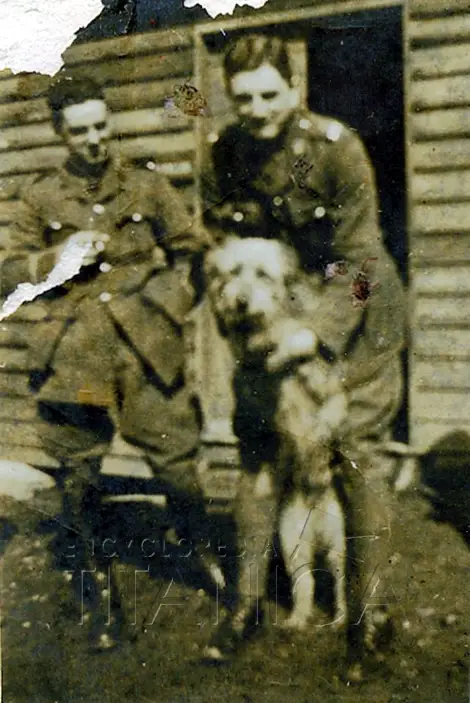
Courtesy Karen Hatton
Cyril was in his cabin, C-28, when the ship was torpedoed. He was indulging in a “sing song.” with Robert Duncan Gray when they heard a slight explosion. Gray said, “That is a torpedo.” Wallace had time to grab his lifebelt and run up to the boat deck. He assisted in the lowering of the boats, and surrendered his lifebelt to 66 year old Jeanie Fyfe of Glasgow after she fell to her knees, said she was a grandmother, and implored him for help.
He swam clear of the Lusitania before she sank, and was able to witness her end from a distance of thirty yards. He managed to climb atop an upturned lifeboat, possibly the same boat as Belle Naish, and from there was rescued.
He contacted Jeanie Fyfe, in August, 1915. He sent a friendly letter in which he inquired about her well being, and stated that his only regret was the loss of his money and wardrobe. Mrs. Fyfe had left his letter unanswered, despite Cyril’s evident concern for her, as of March 20, 1916. On that date she forwarded it to the mother of victim Richard Prichard. She said iIn her own letter to Mrs. Prichard, that she knew that she was being ungrateful, and that Cyril was a very nice young man, but she was still too disturbed by the disaster to contact him. She lived for at least another year, dying in Johnstone, Elderslie, Scotland, of stomach cancer, in 1917.
Cyril Wallace had sent Mrs. Prichard a supportive letter some months previously, in which he asked her if she was certain that Richard had been aboard the Lusitania. Cyril did not recognize him from photos, and doubted that he would have forgotten Richard Prichard if he had seen him among the close to six hundred second class passengers. He wished to bolster Mrs. Prichard’s hopes by raising the possibility that he had not been aboard after all.
Lieutenant Cyril J.G. Wallace was lost in military service on September 9, 1918.
April 2, 1917 saw two Lusitania survivors killed in action.
Osmund Bartle ‘Barty’ Wordsworth, a lecturer in Classics at Trinity College, Toronto, was returning home aboard the Lusitania to join the English army. His sister, Ruth, with whom he traveled, was on sabbatical after her first stint as a missionary in Tokyo, Japan. She was returning home to visit her parents, Canon Christopher and Mary Wordsworth of St. Nicholas, Salisbury.
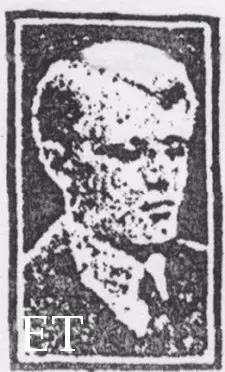
Osmund Wordsworth
(Paul Latimer)
The Wordsworths traveled in second class. According to Ruth’s account, they spent most of their time on board together and did not socialize much with other passengers. Barty may have known Reverend Hugh Carlton Syddall Morris, a fellow lecturer at Trinity College. Ruth thought the crew was friendly, especially stewardess Fannie Morecroft. “The last voyage of the Lusitania must have been one of the calmest and, up to the time of the disaster, the pleasantest,” recalled Barty.
A piece of Wordsworth family history is relevant to the events of May 7, 1915. Barty and Ruth’s mother feared drowning, and insisted that each of her nine children learn how to swim.
The Wordsworths were in the second class dining room on the afternoon of the disaster. Barty listened as “a friend told me at lunch that he had seen what he at first- no doubt rightly- took to be the conning-tower of a submarine, but afterwards was supposed to be a small boat. I had nearly finished lunch when the first torpedo struck the ship with an indescribably horrible sound, not a sharp report, but dull and deadened. There could be no doubt what had happened, and almost immediately the ship began to take a list to starboard. Everybody started up, but after the first shock there was no disorderly rush. I made my way onto ‘C’ deck. Before long, life-saving jackets were brought for those who had not got them already.” He met a hysterical elderly woman on deck to whom he gave his lifebelt.
Barty and Ruth were separated in the confusion. She claimed to have waited, until she was one of the last people to leave the dining room, and then went directly to her cabin to fetch a lifebelt. She said there was no one in the corridor along the way. She ascended the staircase to the boat deck. The list made the lowering of lifeboats difficult. Ruth witnessed many acts of heroism as men tried to help the women and children get away. An explosion occurred, and she was knocked out. When she came to, she was in the water. She said that she did not fear death at all due to her faith,. She a saw a lifeboat nearby and swam to it. The occupants were able to pull her aboard.
Mr. Wordsworth stated:
It was perhaps a quarter of an hour after the first torpedo struck- the second I did not hear- that I heard a sound like breaking glass, and clouds of steam began to pour up. At the same time, the list was greatly increased, and it was clear that the ship was sinking rapidly. I made up my mind to jump, but slipped and fell. The deck was so steep that it was impossible to walk on it, but I managed, after kicking off my shoes, to make a spring and catch something by which I was able to pull myself up to the port side. I climbed over the rail, and was standing on the side, which was almost horizontal, when the ship sank.
I felt no suction, and came up immediately, and had not been more than two minutes in the water when I was hauled on to overturned boat,” remembered Mr. Wordsworth. “After a time, however, we saw a fishing smack coming towards us, and a little later the smoke of several vessels coming from Queenstown. I was taken aboard the H.M.S. Julia and there fed, warmed and given a change of clothing with that hospitality which characterizes the British Navy. It was long after dark when we reached land.”
Neither Ruth nor Barty knew how the other had fared. They had made a pact while aboard ship that should the worst happen, they would not try to find each other in the crowd; but would instead go directly to their boat stations. Each watched the incoming rescue ships, but did not find one another until the following day, when Barty saw Ruth’s name on a list of survivors and met an acquaintance that knew where she was staying. Supposedly, the Wordsworths were reunited in the street.
They left Queenstown that afternoon and took the ferry to England. It was a joyous reunion for the Wordsworth family, though Ruth had an extended stay in the hospital due to her injuries.
Ruth Wordsworth eventually went back to Tokyo, where she worked as missionary for many years. A family member claimed that she once saved another missionary from drowning. Ruth Mary Wordsworth died in Taunton, England on February 21, 1953. Barty joined the army following the visit with his family. He rose to the rank of Second Lieutenant of the Machine Gun Corps of the 21st Coy. He was killed in action on April 2, 1917. Private Robert Hebden, another Lusitania survivor, was killed in action on the same day, in France, and both are buried in Arras Memorial Cemetery.
We have documented the following as Lusitania survivors who were later lost in the war:
1916 August 12th Marichal, Mr. Joseph Phillibert Rene (II) 39 Hemwood, France. KIA
1917January 4th Finucane, Private Noel (crew) 26. KIA
1917 March 27th Nixon, Mr. Harold (crew) 40. Lost on SS Thracia
1917 April 2nd Wordsworth, 2nd Lieutenant Osmund Bartle (II) 29. KIA. Calais, France 1917 April 2nd Hebden, Private Robert (III) 37. Calais, France KIA
1917 August 21st Rossiter, Mr. Laurence (crew) 33. Lost on SS Oslo out of Hull
1917 October 15th Gardner, Lance Corporal Eric Clarence (II) 21 KIA
1917 October 31st Duguid, Private George Davie (II) KIA
1918 February 2nd Jones, Captain Arthur Rowland (crew) 38. Lost on HMT Avanti
1918 May 27th Pells, 2nd Lieutenant Cyril Elmore (II) 27 KIA
1918 August 7th Mosley, Major George Gordon (I) 33 Died of illness in India
1918 September 9th Wallace, Lieutenant Cyril John George (II) 22 KIA
1918 November 7th Griffiths, Lieutenant Christopher William (II) 35. Died of wounds received Oct 29th
1918 November 24th Foden, Private Robert Ernest (crew) 29. KIA
1918 June/July James Haldane (II)
Matthew Backa, and Henry Needham can be added to this list. Backa, of Saskatchewan, was returning to Russia when he boarded the Lusitania. His friends and family in Canada never heard him from again. He may have been lost in the war, the revolution, or in the famine of the early 1920s. Henry Needham was killed in a bombing raid at Sidcup, England, on July 4th., 1944. Perhaps the saddest of all, Kenneth Wakefield, whose mother, Mary Gertrude, was one of the few women in advanced pregnancy to survive, was shot down over France and killed, at age 29, on August 8th, 1944.
A large group of male third class passengers were destined to become war victims of a different sort.
The long-simmering problem between Armenian Christians and Ottoman Turks had reached its flashpoint on April 20th, 1915, with an uprising in the Armenian quarter of Istanbul. On April 24th, 250 Armenian intellectuals and community leaders were rounded up and subsequently executed.
News of the deteriorating situation appeared in the American press. A group of relatively prosperous, middle aged Armenian men from Chicago booked third class passage together aboard the Lusitania’s May 1st voyage. They planned to travel home to see to the safety of parents, siblings, and in some cases wives and children left behind. A smaller group of Armenians from Yonkers, New York, also boarded.
Lost:
Benjamin Ameraiof. 37. Chicago.
Abraham Baba. 45. Chicago
George Baba. 39. Chicago.
Nikola Kaperalia. 33. Chicago
Aziz Ohannia. 35. Chicago
Pera Sargis. 28. Gary, Indiana
Karatioum Seisian. 35. Troy, New York
Asset Tadus. 38. Yonkers, New York
Envia Yohama. 40. Chicago
Saved:
Frank Baba. 30. Chicago
Elie Gililen. 36. Yonkers, New York
Levon Seferien. 29. Troy, New York
George Sergis. 37. Yonkers, New York
Baba Jan Yocab. 33. Chicago
Alvaretz Yohanan. 32. Chicago
The six survivors would have arrived in their homeland just as the forced deportations commenced. Armenian Christians were marched to at least 25 concentration camps, most along the Iraqi and Syrian borders.
The roads and the Euphrates are strewn with corpses of exiles, and those who survive are doomed to certain death. It is a plan to exterminate the whole Armenian people
The New York Times , August 1915.
Between one and a half and three million Armenians were exterminated during the latter half of 1915. The six Lusitania survivors had voluntarily stepped into a trap from which few emerged. Levon Seferien died in New York City in January 1963, but no clues have yet emerged as to the fate of the others.
A FOOLISH SUGGESTION
About the biggest fool suggestion we have heard yet is that the surrendered German ships be sunk just above the spot where the Lusitania went down.
~The Fernley Enterprise
SAILING OVER LUSITANIA GRAVE
Texas Minister, now Y.M.C.A. worker, writes of voyage on “Empress of England”
Christmas Eve was spent sailing down the famous coast of Ireland. The morning came clear and bright, with an exhilarating dash of frost in the pure air. At chapel…the whisper went around that the Irish coast was in sight. After ten stormy days at sea, one hint of land was sufficient and all rushed out. The first thrill of joy soon changed to a strange sadness, when the consciousness came that we were riding over the watery graves of 10,000 men, women, and children. This is the most tragic sea spot in all the immense stretches of water…I stood for hours on the bridge with Capt. George S. Webster, who knows intimately every span of this eyes of those awful dark days.
Said Captain Webster: “From the point where we first saw land this morning, to where we get into the Irish Sea, some fifty ships of all kinds were torpedoed and sent to the bottom.” Hearing the gong calling to tea, I was about to turn away when the big hearted captain said: “Keep here a bit, and about 4:30 we will pass over the Lusitania.”… certainly I stood there somewhat transfixed, as my eyes called trooping up scenes of that frightful half hour. My cabin steward was on the ill-fated Lusitania, and he told me of the scramble and the cries that came from women and children. When Captain Webster finally said: “Along here is about where she was when first struck.” instantly I could see those screaming women and hear the cries Germany openly celebrated. The scene actually became so tangible and real that I covered my face.
February 1919.
Fort Worth, TX.



